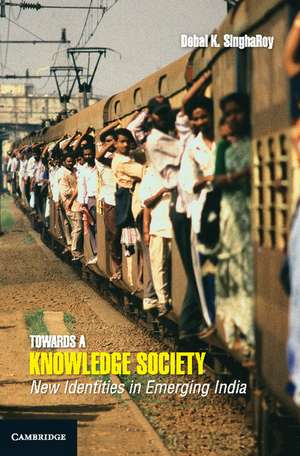Towards a Knowledge Society: New Identities in Emerging India
Autor Debal K. SinghaRoyen Limba Engleză Hardback – 15 oct 2014
Preț: 528.11 lei
Preț vechi: 654.21 lei
-19% Nou
Puncte Express: 792
Preț estimativ în valută:
101.07€ • 109.74$ • 84.90£
101.07€ • 109.74$ • 84.90£
Carte indisponibilă temporar
Doresc să fiu notificat când acest titlu va fi disponibil:
Se trimite...
Preluare comenzi: 021 569.72.76
Specificații
ISBN-13: 9781107065451
ISBN-10: 1107065453
Pagini: 397
Dimensiuni: 160 x 236 x 34 mm
Greutate: 0.79 kg
Editura: Cambridge University Press
Colecția Cambridge University Press
Locul publicării:New York, United States
ISBN-10: 1107065453
Pagini: 397
Dimensiuni: 160 x 236 x 34 mm
Greutate: 0.79 kg
Editura: Cambridge University Press
Colecția Cambridge University Press
Locul publicării:New York, United States
Cuprins
List of tables and figures; Preface; 1. Introduction: conceptualising knowledge society: critical dimensions and ideal image; 2. Critiquing and contextualising knowledge society; 3. Strategising for knowledge society in India: the shifting backdrops and emerging contexts; 4. Education for a knowledge society in India; 5. Information and communication technologies for a knowledge society; 6. Indian growth story: the service and knowledge dynamics; 7. Education, ICTs and work: the divergent empirical reality in India; 8. The knowledge society: work, workers and relations; 9. Knowledge society: culture, continuity and contradictions; 10. Conclusion: marginality, identity, fluidity and beyond; Bibliography.
Recenzii
'Professor Debal K. SinghaRoy writes in a way that is both lucid and analytically profound … This work will leave a lasting impact on the sociology of knowledge and in the study of the history of ideas.' Dipankar Gupta, former Professor, Centre for the Study of Social Systems, Jawaharlal Nehru University, New Delhi
'This is a detailed, subtle and fascinating account of the transformation of India toward a fully realised 'Knowledge Society' … To quote the Planning Commission (2001), 'we missed the industrial revolution but we should not miss the information and knowledge revolution' … The Knowledge Society may offer greater possibilities for freedom, dignity and social security. Amen to that.' Ellie Chambers, Professor Emeritus, Institute of Educational Technology, The Open University
'This rich and ambitious study makes clear that India will be a major player in the brave new world of digital networks and 'smart' work … Towards a Knowledge Society is an important addition to knowledge and understanding for commentators who have yet to appreciate the need to 'reorient' away from the West.' Frank Webster, City University London
'Debal SinghaRoy shows the dark side of India's transformation to a knowledge society … India's transformation becomes a story of despair for the millions who are excluded and marginalized, but also hope for liberation from oppression and for the formation of new identities.' Stephen Castles, Research Chair in Sociology, University of Sydney
'This is a detailed, subtle and fascinating account of the transformation of India toward a fully realised 'Knowledge Society' … To quote the Planning Commission (2001), 'we missed the industrial revolution but we should not miss the information and knowledge revolution' … The Knowledge Society may offer greater possibilities for freedom, dignity and social security. Amen to that.' Ellie Chambers, Professor Emeritus, Institute of Educational Technology, The Open University
'This rich and ambitious study makes clear that India will be a major player in the brave new world of digital networks and 'smart' work … Towards a Knowledge Society is an important addition to knowledge and understanding for commentators who have yet to appreciate the need to 'reorient' away from the West.' Frank Webster, City University London
'Debal SinghaRoy shows the dark side of India's transformation to a knowledge society … India's transformation becomes a story of despair for the millions who are excluded and marginalized, but also hope for liberation from oppression and for the formation of new identities.' Stephen Castles, Research Chair in Sociology, University of Sydney
Notă biografică
Descriere
This book studies how the knowledge society has created new conditions of marginalities while empowering people through new age connectivity.
